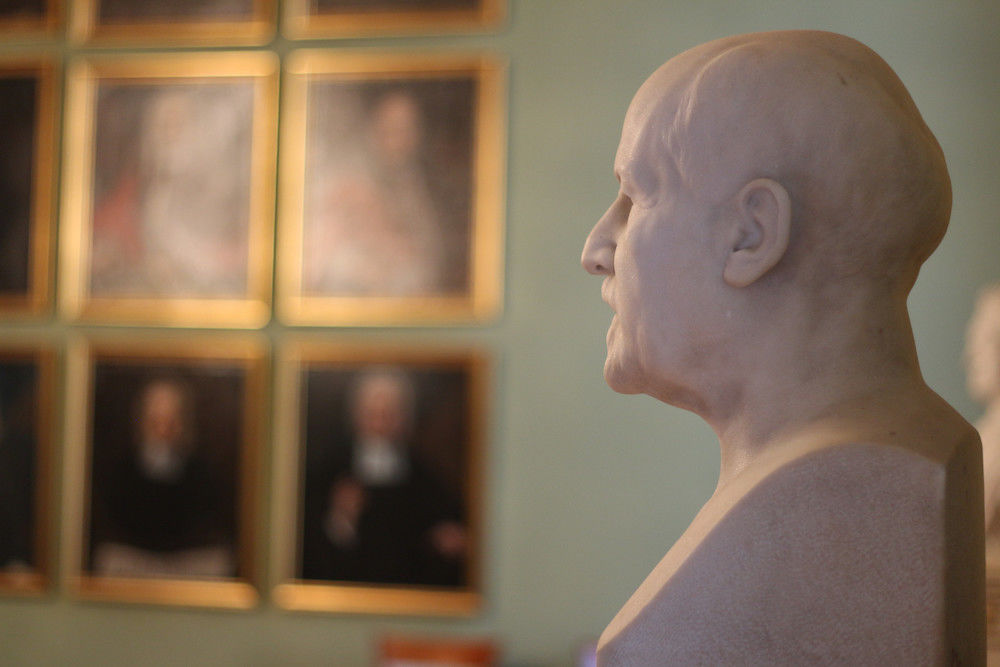Big Names: Georg Cantor

Had there been a Nobel Prize for mathematics, Georg Cantor would quite certainly have been a contender. Unfortunately, however, the Prize simply isn’t awarded within this category. Even the Fields Medal and the Abel Prize, both the highest of accolades, which are now awarded to mathematicians as an equivalent for the Nobel Prize, were not awarded during Cantor’s lifetime. And so unfortunately, his genius was never recognised in this way.
Having said that, an opera was later written in Cantor’s honour and in the City of Halle there is a street and a school which specialises in mathematics, both of which carry his name. The Institute for Mathematics at Martin Luther University Halle-Wittenberg (MLU) is of course housed in the “Georg-Cantor-Haus”. In 2007, the well-known American author David Foster Wallace created a memorial to Cantor in the form of a book. “Georg Cantor. Der Jahrhundertmathematiker und die Entdeckung des Unendlichen” is the German title of the book, “Everything and More: A Compact History of Infinity”, a non-fiction narrative in which Foster Wallace, also a highly talented mathematician, tries to pin down the concept of infinity. This is an aim which Cantor himself pursued intensively during his time at the University of Halle.
Cantor had almost achieved his aim, and was apparently preparing to move away from the City of Halle. It would seem that his position was not particularly well paid. Cantor was not at least earning enough to provide for his wife and six children – four girls and two boys – and sustain the living standard he desired. So Cantor began looking for alternatives. He had already built a family home in 1885, today 13 Händelstraße, which he moved into a year later. But money continued to be tight. Cantor’s letters reveal just how dissatisfied he was with this situation. The letters also reveal that Cantor applied for positions at other universities. It was solely because he was not wanted at these other universities that Cantor remained at the University of Halle. The great mathematician thus spent almost the entirety of his academic life in the city.
Georg Ferdinand Ludwig Philipp Cantor, born on 3 March 1845, in St. Petersburg, to a stockbroker and his wife, is recognised today as having invented set theory. From 1862, Cantor studied mathematics in Zurich, Gottingen and Berlin, where in 1867, having written a thesis on number theory, he gained a PhD. In 1869 he qualified to teach at the University of Halle, where he later taught as a private professor. In 1877, he was given full professorship.
Cantor’s central works which served to establish set theory were completed in the City of Halle between 1879 and 1884. By the end of the nineteenth century, this theory was of primary interest within the field of mathematics. The ideas, methods and theories which Cantor contributed to this area were new and at the time, many of his contemporaries failed to correctly understand Cantor’s work, some of them even rejecting it.
Cantor’s family home continued to serve as a popular meeting place for many members of the University, whereby Cantor hosted numerous salon parties at which the man of the house would accompany his wife Vally, a trained singer and pianist, on the violin. But Cantor was deeply depressed by the fact that his work had not been properly understood. When Cantor’s youngest son died in 1884, Cantor experienced a nervous breakdown and following this, continued to suffer from depression.
The value of his mathematical works begun to be recognised only after his mental difficulties had begun to impact on his ability work. Indeed, the full significance of his contributions was fully recognised only after his death. The mathematician David Hilbert later wrote to one of Cantor’s daughters, “Only a few days ago, I had the opportunity to learn how great an impact your father’s work can have on a congenial nature. Whilst in Berlin, I challenged Einstein in regards the classical procedures in view of the evidence presented by your father, to show that irrational numbers cannot be discounted. And Einstein, who understood everything quite immediately, was quite overcome by the enormity of these ideas...”
Cantor loved the essence of mathematics. This is, he once said, to be found “in its freedom”. He made use of the possibilities that this exact science offers those who are capable of it, of functioning within these higher spheres. This is an occupation, which need not culminate in the completion of a task. Or, as Cantor put it, “in mathematics, the art of asking a question is more valuable than solving problems.”
In 1913, Cantor became an emeritus professor. He died more than 100 years ago, on 6 January 1918 in a sanatorium in the City of Halle. This year, the anniversary of his death was also honoured at MLU. The festivities were a timely occasion on which to once again commemorate his brilliance. Karin Richter, Professor at the Institute of Mathematics, said: “Cantor opened our eyes to a new universe of numbers, and so laid the foundations for mathematics as we know it today.”
Große Namen
Die Geschichte der Universität ist mit vielen bekannten Namen oder großen Ideen verbunden. Nicht immer hat jeder sofort die Fakten parat, die sich dahinter verbergen. Das soll sich an dieser Stelle ändern: Die Rubrik "Große Namen" erinnert an herausragende Wissenschaftlerinnen und Wissenschaftler aus Halle.
